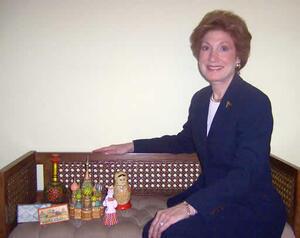Shannie Goldstein
Shannie Goldstein used her creativity to outsmart the KGB, bringing information to and from refuseniks in the Soviet Union. Goldstein’s work with refuseniks began in the 1970s, helping immigrants from the USSR relocate and adjust to life in Baltimore. With her husband, Rabbi David Goldstein, she made three trips to the Soviet Union, smuggling Hebrew music into the country in her guitar case and bringing out vital contact information disguised in gift boxes. A resourceful woman of deep compassion, Goldstein connected with the refusenik community through music and brought media attention to their struggle in the US. She is an adjunct professor of Hebrew language in the Jewish studies department at Tulane University and also works as a licensed clinical social worker in private practice. Shannie Goldstein was honored at the 2005 Women Who Dared event in New Orleans.
Shannie recounts her family history and childhood growing up in Lowell, Massachusetts, where she took care of her four younger siblings. She describes her experience supporting her father's work as a health practitioner. Shannie then discusses her early Jewish education and living with her distant cousin to shorten her commute to Hebrew high school in Brookline. She studied hard in high school and college, where she met her husband, David. Her relationship with David, she explains, led to her career path. David was a Rabbi, and Shannie worked as a teacher at their synagogue and became very involved in the congregation. Goldstein was a bridge between the traditional homemakers of her mother's generation and the contemporary working women of her daughter's generation. Shannie talks about working alongside her husband and developing the social work practice she continues today. Shannie and David moved to Baltimore and became involved with supporting the Refusenik community, finding housing, and helping them adjust to American life. David then took a position on the National Conference on Soviet Jewry Board, and they moved to New Orleans. Shannie continued to support the Soviet Jewry movement, traveling to the Soviet Union on three separate occasions to serve as a link between the Refuseniks and the outside world. She brought educational materials for the Refuseniks to learn Hebrew and passed names through customs to the outside world by sealing them inside gift shop boxes. Goldstein noted the pressure she faced and the scrutiny involved in keeping her and her husband undercover from the KGB. Shannnie became very close with the Refuseniks she worked with and described the hardships of watching close friends be imprisoned. Shannie provides commentary on the feminist movement, emphasizing the need for equal treatment of the sexes but that women should also continue playing to their strengths as nurturers. Goldstein also comments on her breast cancer experience, saying it was nowhere near as scary as her trips to the Soviet Union. Finally, Shannie reflects on her and David's influence on their children's involvement in the Jewish community.



